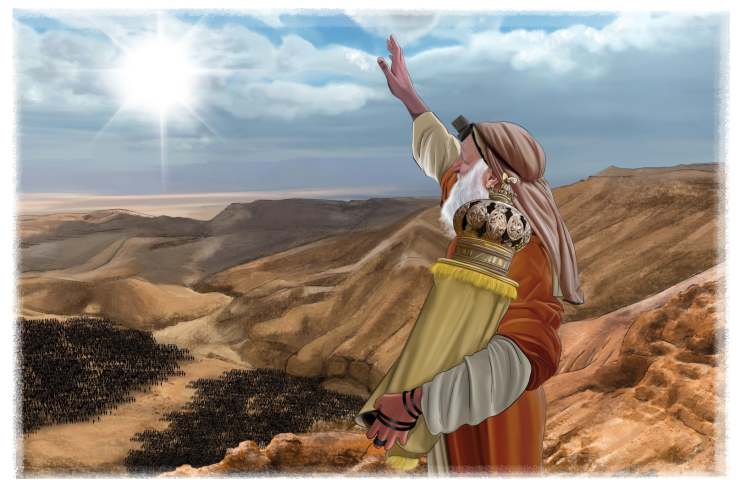Story: A Bris on Gimmel Tammuz!
If you’d call the name “Mendel” in a crowded playground of a Chabad yeshiva, lots of kids would turn around. That’s because many Chabad Chassidim name their sons “Menachem Mendel” after the Lubavitcher Rebbe • By Baila Brikman – From The Tzaddikstory.org Collection • Full Article
By Baila Brikman – From The Tzaddikstory.org Collection
If you’d call the name “Mendel” in a crowded playground of a Chabad yeshiva, lots of kids would turn around. That’s because many Chabad Chassidim name their sons “Menachem Mendel” after the Lubavitcher Rebbe.
But for a Sanzer Chassid to name their son after the Lubavitcher Rebbe? That’s not nearly as common. Let’s find out why Shimmy Klein, a Sanzer Chossid from Belgium, named his son Menachem Mendel:
When Shimmy was a young man, he got married and lived in Brussels with his wife. He was a popular chazzan, singing the tefillos and uplifting the people in shul. But in his personal life, things weren’t so smooth.
You see, he didn’t have children.
“We’re so sorry,” the doctors had told them, “but it’s basically impossible for you to have children naturally. You can try treatment, but even that might not work.”
Shimmy and his wife were very sad because they really wanted to have children. Even though the treatments were very complicated and expensive, they decided that they would try.
Who knew? Maybe the treatments would help them become parents!
They did one treatment and then another… and then another, but none of them worked. No matter what they tried, they still didn’t have children.
After a while, they felt that it was time to move on. ‘Meshane makom, meshane mazel,’ Shimmy thought hopefully. Maybe if we move to a different place, our mazel will change for the better.
Like all Chassidim do before making a big decision, they asked their Rebbe for advice. Shimmy went to the Sanzer Rebbe and asked, “Should we move to Eretz Yisrael or America?”
“Move to America,” the Sanzer Rebbe instructed.
So that was it. Shimmy and his wife began to pack up their house, filling box after box with all their belongings. They felt sad to be leaving, but they also felt hopeful that maybe things would be better in a new place.
A week before their big move, they sent the boxes off to America and went to say goodbye to their friends. One of them, a Chabad Chassid named Dr. Herschel Greenberg, was sad to see them go. He knew what a hard time they were having, and he wished he could help.
“You know what?” he told Shimmy. “This is your last week here. Please come to me for Shabbos. We would love to host you before you go.”
That Shabbos, Shimmy and his wife found themselves in Dr. Greenberg’s house. It was Shabbos Gimmel Tammuz, Parshas Korach.
The table was set beautifully and was filled with platters of delicious Shabbos food. Shimmy felt emotional that he would soon be far away from his friends and community, but he was glad to have a final Shabbos to spend together with everyone.



Everyone gathered around the table. Dr. Greenberg filled his kiddush cup to the top with sparkling red wine, and everyone waited for him to lift it up and start saying kiddush.
But to their surprise, he turned to Shimmy and said, “I have something very special to tell you. When I was a young bachur in 1984, the Lubavitcher Rebbe called me over and gave me a bottle of wine. I didn’t know why he gave it to me, but I knew it was for an important reason. I put it away in a really good hiding spot to keep it safe, but because it was such a good hiding place, I didn’t remember where I put it! I couldn’t find it for many years.
“And you know what?” he said in a voice full of emotion, “I finally found it a few weeks ago. I want to use this special bottle of wine to make a l’chaim for you and give you a bracha on this holy day of Gimmel Tammuz!”
He looked straight at Shimmy and said, “L’chaim! In the zechus of the Lubavitcher Rebbe, you should have a baby boy – and his bris should be next year! Make sure to call me right away, because I want to be the mohel.”
Dr. Greenberg picked up his becher and made kiddush. Afterward, they made a l’chaim and drank from the Rebbe’s wine.
Shabbos passed quickly. A few days later, Shimmy and his wife boarded the plane and headed to New York. They settled in Boro Park, found new jobs… and completely forgot about Dr. Greenberg’s bracha.
Much to their surprise, they soon found out that they were expecting a child! They were so excited! After waiting so many years, they couldn’t wait to hold a precious baby of their own.
As the months passed, their excitement grew. One Shabbos, two weeks before the baby’s due date, Shimmy and his wife rushed to the hospital. It was time to have their baby. Early.
Baruch Hashem, they had a healthy baby boy. He was so tiny and cute, and they loved him very much.
On Motzaei Shabbos, just a few hours later, Shimmy suddenly remembered Dr. Greenberg’s bracha. Wait a second, he realized, next Shabbos, when my baby will have a bris, is Shabbos Gimmel Tammuz – exactly like Dr. Greenberg’s bracha!
He dialed Dr. Greenberg’s number with shaking hands and told him the good news. Dr. Greenberg was thrilled! He dropped everything he was doing and booked a flight to New York so he could come in time to be the mohel at the bris.
And that’s why Shimmy Klein, a Sanzer Chassid, named him son Menachem Mendel. They had waited many years for a child, and they wanted to say thank you to the Lubavitcher Rebbe for their special bracha.



***
This amazing miracle happened on the special day of Gimmel Tammuz. But it’s not the only miracle that’s connected to that day. There are many more – including a story written about in the Navi that happened on Gimmel Tammuz 2488, thousands of years ago.
On that day, an incredible miracle happened that shocked the entire world.
After getting the Torah from Hashem at Har Sinai, the Yidden wandered in the hot desert for forty years. Finally, in the year 2488, it was time to enter Eretz Yisrael.
Before they went to Eretz Yisrael, Moshe passed away. Yehoshua took his place, becoming the new leader of the Yidden. He was supposed to lead the Yidden into Eretz Yisrael – but there was a problem.
Eretz Yisrael was full of goyishe nations who didn’t want the Yidden to take over the land that they had been living in for so long. Many of these nations tried to fight the Yidden to stop them from coming, but Hashem made sure the Yidden would always win.
On Gimmel Tammuz 2488, the Yidden ran into a lot of trouble. They had just made peace with the nation of Givon – but the Emori nation wasn’t very happy about it. They were furious that their neighbors had given their land to the Yidden.
“What is this that we hear?!” the Emori kings roared. “The people of Givon made peace with the Yidden? This means war!”
They gave orders, and soon their strong, massive armies began marching toward Givon.
The people of Givon were terrified. They ran to Yehoshua and cried, “We need your help! We made peace with you, and now the Emorim want to fight with us! Please save us from the Emorim!”
We should help the wicked nation of Givon? Yehoshua thought. What for? They don’t deserve our help! They acted dishonestly and tricked us to make this treaty. They don’t deserve our protection. As he was about to refuse, Hashem spoke to him:
“No, Yehoshua,” Hashem told him, reading his thoughts. “Don’t push them away. Hurry to help them!”
Quickly, Yehoshua gathered the Yidden and they began to fight against the Emorim. Hashem was on their side, fighting the war for them and making sure that they would win.
As they fought, Hashem made the Emori fighters feel very scared. Even though they were bigger and stronger than the Yidden, they became terrified of them! Soon, they were running away from the Yidden, yelling in fright and pushing each other away so they could escape.
Not only that, but Hashem made huge hailstones pour down on them from the sky. These hailstones were leftovers from Makas Barad, when Hashem had sent hailstones to punish the Mitzriyim. They had waited patiently in the air for over forty years to help fight against the enemies of the Yidden – and there are still some left to be used before the coming of Moshiach!
The Emorim couldn’t fight like this. They were terrified of the Yidden and we’re running away in confusion with heavy hailstones falling on their heads! Many of them died, and the ones who didn’t, ran away for their lives.
This battle happened on Erev Shabbos. When shkiah came, the Yidden still hadn’t completely won. There were still a few Emori fighters left who were very big and powerful. The sun began to set behind the sandy mountains, filling the sky with a dusky orange glow.
If we don’t finish the war now, the Yidden will have to fight on Shabbos, the holy day of rest, Yehoshua realized. We can’t let that happen!
Out of the corner of his eye, he saw the Emori magicians start doing their magic. He shivered, becoming very scared.
He hugged a Sefer Torah in his arms and then raised his hands to Shamayim to daven to Hashem. He turned to the sun and shouted, “Sun, moon, and stars, stop moving in the sky!”
“What chutzpah!” the sun cried. “Have you ever heard of a small, physical person telling the big, fiery sun what to do? I was created before you, on the fourth day of creation. People were only created on the sixth day. You can’t tell me what to do. I am much greater than you!”
Yehoshua stood tall. He wasn’t afraid of the fiery, angry sun.



“It doesn’t matter if I’m smaller than you. I am following Hashem’s instructions. And even more – Hashem gave Avrohom Avinu power over the heavens. And you already bowed to Yosef, who was a physical person!”
But the sun didn’t want to listen. “If I don’t do my job of moving in the sky, who will sing praises to Hashem instead of me?” it asked doubtfully.
“I will do it,” Yehoshua promised. “I will sing the same songs of praises until you can continue moving.”
Right away, the sun, moon, and stars stopped moving and froze in the sky. Time completely stopped. Instead of Friday afternoon turning into Friday night, it stayed Friday afternoon. The sun was still lighting up the sky, as if it was still the day!
The sun stayed frozen in place for thirty-six hours, until the Yidden won the war.
This was the first time that the sun stood still since Hashem created the world! All the goyim saw this miracle, and they were very impressed. Everyone realized that Hashem is the One Who created the world and is in charge of everything that happens – from the smallest detail to the biggest miracle, like making the sun stand still.
***
Since the times of Yehoshua, thousands of years ago, Gimmel Tammuz was a special day. It was a day when time stood still, when the sun didn’t set.
These days, Gimmel Tammuz is known as the day when we couldn’t see the Lubavitcher Rebbe with our physical eyes anymore. It seemed that he went away from the world.
But just like on Gimmel Tammuz many years ago, we know that “the sun didn’t set.”
The Rebbe is still with us, because tzaddikim — and especially the Nasi HaDor who is the Moshe Rabbeinu of the generation — never truly pass away. Even though we can’t see them anymore, they are still with us like before and even more, giving us brachos and helping us connect to Hashem.
The Rebbe told us that the war is basically over, and there is no real reason why we can’t see the Geula yet. But what this means to us is that there is still something, something small, left for us to do.
The Rebbe was once asked why Moshiach isn’t here yet after so many good things have been done by the Rebbe and his shluchim? The Rebbe put two fingers together to indicate a small amount and said, “It seems that such a little bit remains to fill the cup and make it overflow. Therefore, whenever I speak to the Chassidim, I urge them to do something.” The Rebbe put it like this, in English, “I don’t let my Chassidim sleep.”
Let us not sleep. Let’s continue learning Torah and doing mitzvos so we can win the fight against galus! Then the sun will finally be able to shine again in a revealed way and bring in the ultimate Shabbos – which is the time of Moshiach!
76
Join ChabadInfo's News Roundup and alerts for the HOTTEST Chabad news and updates!











































